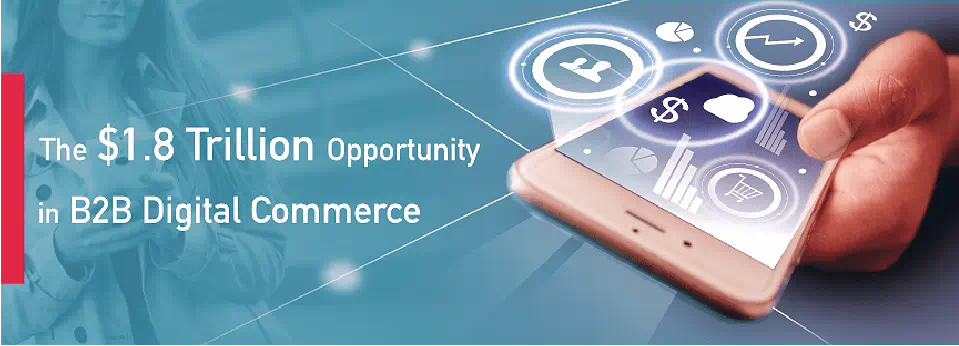

Forrester projects that the B2B digital commerce market is on track to hit $1.8 trillion by 2023 in the U.S., which represents 17% of B2B sales. This staggering growth means that business models focused solely on traditional sales channels like sales representatives and electronic data interchange (EDI) will face steep competition from more modern, digital strategies.
To keep up with the competition, it’s critical for businesses to make the move toward selling online sooner rather than later — otherwise, they will miss out on a huge share of the market.
What Your B2B Customers Want
B2B customers are getting younger and more tech savvy. They prefer online chats to human interaction and don’t have the time to deal with existing homegrown systems that support outdated processes. On top of their digital preferences, modern-day B2B customers are more informed and have more choices than ever before.
With waves of content being thrown at customers from every direction, personalization and customization are incredibly influential toward buying decisions. Specifically, B2B customers expect the following:
- Personalized Customer Experiences
By implementing customer-based pricing models and a product catalog, you can tailor your ecommerce operations on an individual level.
- Self-Service Capabilities
From managing their own accounts to paying invoices online, customers want fast, easy, and mobile self-service options.
- 24/7 Online Sales Channels
Your customers should be able to access your digital commerce website 24/7 from their desktops, laptops, tablets, and mobile devices.
A digital commerce platform is paramount to offering your customers a personalized experience whenever and wherever they need.
Why You Need a B2B Digital Commerce Platform
Millennials, a generation known for their familiarity with all digital outlets, make up nearly half of all B2B researchers. In addition, the interest in purchasing online is becoming a commonality among a wide range of demographics because of its convenience. With that said, when a customer is ready to buy, don’t you want a modern online ecommerce presence to capture their business?
Here are several more key benefits for B2B businesses:
Economic Benefits
- Creates a new sales channel
- Reduces customer service costs
- Extends your customer reach
- Improves customer service and retention
- Comes with a cost-effective implementation
Functional Benefits
- Provides customer-driven self-service from a responsive online platform
- Offers faster and easier implementation
- Speeds time to benefit via pre-built B2B templates
- Reduces transaction processing times with faster payables
- Decreases data duplication and issues with tighter integration
Implementing a Digital Commerce Platform
Hitachi Solutions’ Commerce Suite for B2B is an end-to-end, web-based system that integrates with your accounting, shipping, and inventory systems.
The software allows you to quickly and easily implement digital commerce to:
- Reach more customers
- Ensure a personalized customer journey 24/7
- Better manage inventory and pricing
- Have access to more accurate customer and sales data
- Ultimately be more competitive in today’s market
Features
In one dashboard, your digital commerce strategy should include a full range of ecommerce capabilities that can integrate with your existing systems for real-time reporting, marketing campaign management, and merchandising management.
The Commerce Suite for B2B system does just that and more, with features including:
B2B Optimization
- B2B optimized templates for manufacturers and distributors
- Integrated with over 20 credit card payment gateways including Authorize.net, PayPal, and Amazon Pay
- Connected to all major shipping carriers and third-party tax providers
- Supports multiple currencies and languages
Multiple Deployment Options
- Pay-as-you-go subscription or perpetual license
- Cloud ready, on premise, or hybrid
Microsoft Dynamics Integration
- Supports integration with D365 Finance and Ops, D365 Customer Engagement, Dynamics ERP, Dynamics CRM, Dynamics GP, Dynamics NAV, and Dynamics SL
- Integration entities include: customers, addresses, sales orders, inventory, pricing, invoices, payments, aging statement, and product catalog
Sage ERP Suite Integration
- Supports integration with Sage MAS 200 and 500
Combined with your offline sales efforts, a digital commerce strategy can give you the leverage you need to deliver unbeatable customer service, simplify your back office functions, and grow through digital transformation.
Ready to see how it works? Schedule a demo of Hitachi Solutions’ Commerce Suite. Or, you can contact us to learn more about our consulting, implementation, and integration expertise.


